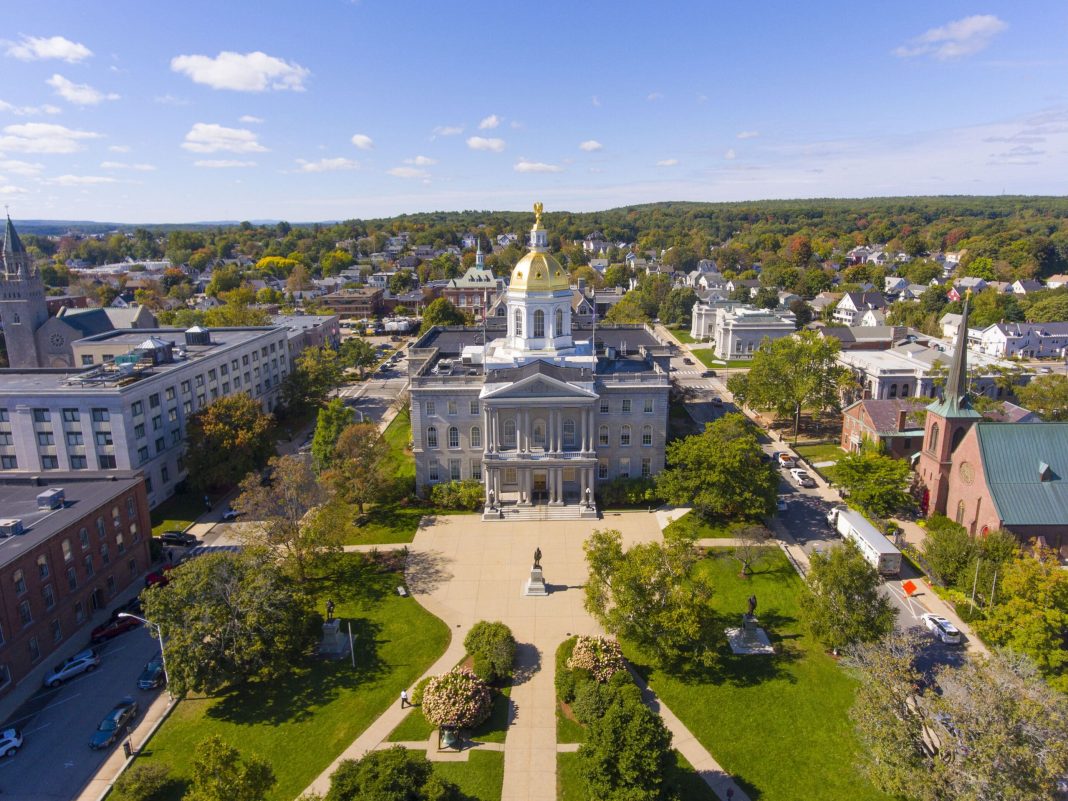New Hampshire didn’t hold a voter ballot, nor did it officially pass a legalization bill yet. But that doesn’t mean its not working on something. A new bill recently signed, creates the requirement in New Hampshire for setting up a commission to look into opening a legal cannabis market. This is a new model for legalization, and it puts New Hampshire in line to legalize recreational weed.
How laws pass
We’re used to a few different ways of passing laws. The most common is for a government representative to think something up, write it down as a draft, for that draft to be argued over in both sides of congress (or whatever else the parliamentary system is called), voted on, and either passed or left for dead. Most of the time, this is how things happen. And it happens whether the majority of the people agree with the actions or not.
A small percentage of the time, we the people are allowed to have a more direct say. This happens through voter ballots which are voted on the same way a person votes for a candidate in an election. They are held during elections, and show up as a separate question that voters can directly respond to. If the majority say ‘yes,’ the law is instated. If the majority vote ‘no,’ then its not. In this case, it happens whether the government agrees with the action or not.
These initiatives are put together generally by a non-governmental group, like an activist group. The initiatives must go through review, and comply with state and federal law, in order to make it to the ballot. Many problems arise because of pushback by governments trying to find any reason to keep an initiative off the ballot, or change the result. These ballots represent a lack of control for elected officials, and are not always wanted. They are also much harder to amend, as they aren’t a government creation, but a creation of the people.
Yet another way for laws to be instated, is through the court system. This happens when a high court makes a binding decision that must be respected by lower courts. This kind of law is called case law, which comes from jurisprudence; the overriding of legislative law by judicial law. Sometimes such a ruling can go in contrast to published laws, and sometimes it fills the gap where no law formally exists. For example, when an appellate court in California ruled that a delta-8 brand could protect its trademark, it validated that the products in question, were legal; since illegal products can’t be trademarked.
Jurisprudence pops up several times in the world of weed legalization. It’s how Mexico became the fourth legal country. In Mexican law, when the Supreme Court rules on a single subject the same way, five times consecutively; it becomes law. Georgia likewise became the second legal country in 2018 when it too dropped laws of prohibition via Supreme Court ruling. And South Africa, which isn’t completely legal, got to its near-legality by its Supreme Court, which backed up laws of privacy within the country.
New Hampshire and a new model for legalization
New Hampshire did something similar to what both Switzerland and Germany recently did. It made somewhat of a plan to legalize; but without a formal date or details or actual law passage. And like those two, New Hampshire is setting up a model to study the industry, before a full legalization. This isn’t to say that New Hampshire’s version will mirror the pilot program Switzerland enacted, or the one Germany is putting together; but it does create a similar paradigm in legalization models.
According to a Marijuana Moment article, Governor Chris Sununu recently signed a bill that contains a provision to create a commission, which will investigate recreational sales. It will then take this information and formulate legislation for a legal market. Sununu did this despite having his own reservations about a cannabis market. He said that a legalization in the state is going to happen regardless. He understands that other measures might not be as much up his alley, and that he might not have veto power.
The bill provision was initially to set up a commission for research into a legal setup, only. However, in the process of passing it, the bill was amended. The amended version requires the findings of this commission, to be translated into an actual system of commerce. This can then be considered by legislators next year; so its certainly not automatic. The commission is due to turn in work on December 1st of this year.
Said Sununu of the bill, “New Hampshire has an opportunity to safely regulate the sale of marijuana with a model few others can provide. By establishing a commission to study state-controlled sales, this bill will bring stakeholders from across New Hampshire together to ensure that preventing negative impacts upon kids remains our number one priority.”
What else does the law do?
New Hampshire is working toward a recreational cannabis legalization, but doing it in a slightly different way then other states. However, this provision to set up a legalization commission to investigate the industry and create a market, isn’t the only provision of interest from this new law. There are a couple more things to note.
A separate provision relates to another big issue: opioids. Up until now, if a pain patient wanted access to cannabis medicine, they had to try all other medication treatments first, including opioids. This means a medical cannabis recommendation was impossible, without the use of opioids beforehand. The new law takes away this requirement; and allows pain patients to access cannabis medicine, without using opioids.
It has yet another provision which relates to the cannabinoids market. It clarifies that hemp-derived cannabinoids like delta-8 THC are not approved for sale in the state. The issue of hemp-derived cannabinoids has been a growing issue for governments since the passage of the 2018 US Farm Bill.

As such industries are thought to cannibalize legal markets, state governments are passing different laws to either try to regulate the products (including taxation), or to try to get rid of them altogether. New Hampshire falls under the latter with this provision.
New Hampshire and cannabis
This is not the first time that recreational legalization has come up in New Hampshire, but as of yet, nothing fully passed. Earlier this year, the state’s House of Representatives did pass a standard legalization bill. But it was subsequently defeated in the Senate. In 2014, a prior attempt was made as well. That year, House Bill 492 came up, which was based on Colorado’s Amendment 64, the voted-in measure that legalized recreational cannabis in that state. This also passed the House in 2014, but failed to make it through the Senate.
New Hampshire did pass a decriminalization measure in 2017, and was the 22nd state in the country to do so. According to the policy, cannabis possession went from a misdemeanor charge, to incurring fines only. A first and second infraction garner $100 in fines, and a third, $300. If a person has four infractions in three years, they get a misdemeanor charge.
The state also has a medical cannabis law which was passed in 2013, called the Therapeutic Cannabis Program. The bill covers the use of medical cannabis for chronic and terminal cases, as well as debilitating conditions. It’s a pretty strict bill which doesn’t allow this access until all other medical avenues have been tread (although the new law allows pain patients out of using opioids). And it doesn’t allow for home-cultivation for medical purposes, either.
Should this legalization path continue, New Hampshire will catch up to its New England compatriots, all of which have recreational cannabis already. These include: Maine, Massachusetts, Rhode Island, Connecticut, and Vermont.
Conclusion
New Hampshire isn’t a legal state yet. Even if all this does go through, it could take some time, maybe years. But, nonetheless, it stands out as a new legalization model in the US, and paves the way for New Hampshire to join the ranks of the legal states.
Welcome readers! We’re happy to have you with us at Cannadelics.com, an independent news site specializing in the growing cannabis and hallucinogen spaces. Hit us up frequently to stay updated; and get yourself signed up to the Cannadelics Weekly Newsletter, so you’re never late to get the news.





